Business Environment Report: Iceland Supermarket - External Factors
VerifiedAdded on 2020/01/15
|17
|5900
|366
Report
AI Summary
This report provides a comprehensive analysis of the business environment, focusing on Iceland Supermarket. It begins with an introduction to the organization, its purposes, and its stakeholders, including customers, employees, suppliers, and government bodies. The report then delves into the different types of economic systems and their impact on the organization, followed by an examination of market structures and market forces. The analysis extends to the influence of the business and cultural environment. The report concludes with an assessment of international trade and global factors, as well as the impact of European Union policies on Iceland Supermarket. The report uses Carol's pyramid to determine the responsibilities of the organization. The report also provides strategies that employees can use to meet these responsibilities.
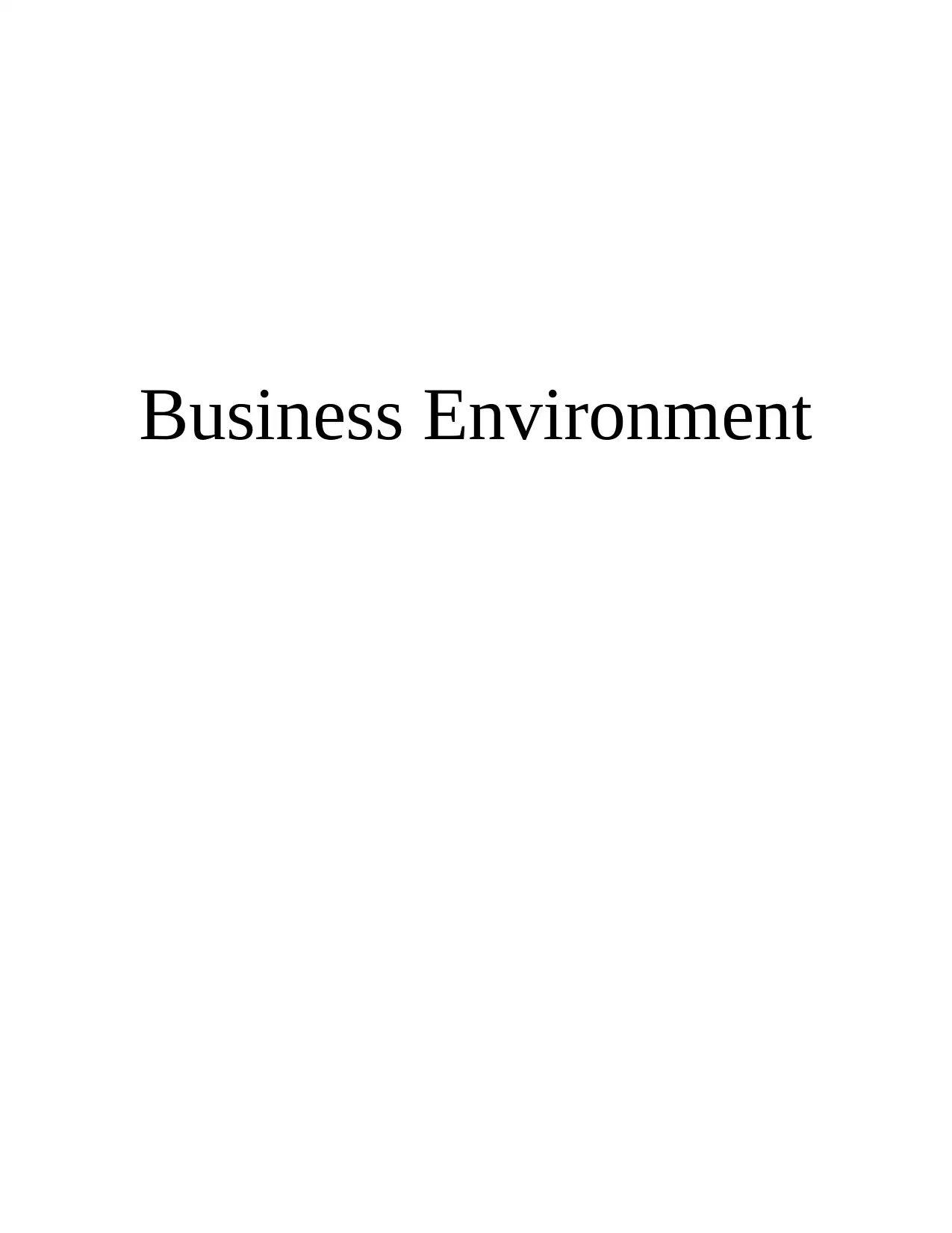
Business Environment
Paraphrase This Document
Need a fresh take? Get an instant paraphrase of this document with our AI Paraphraser
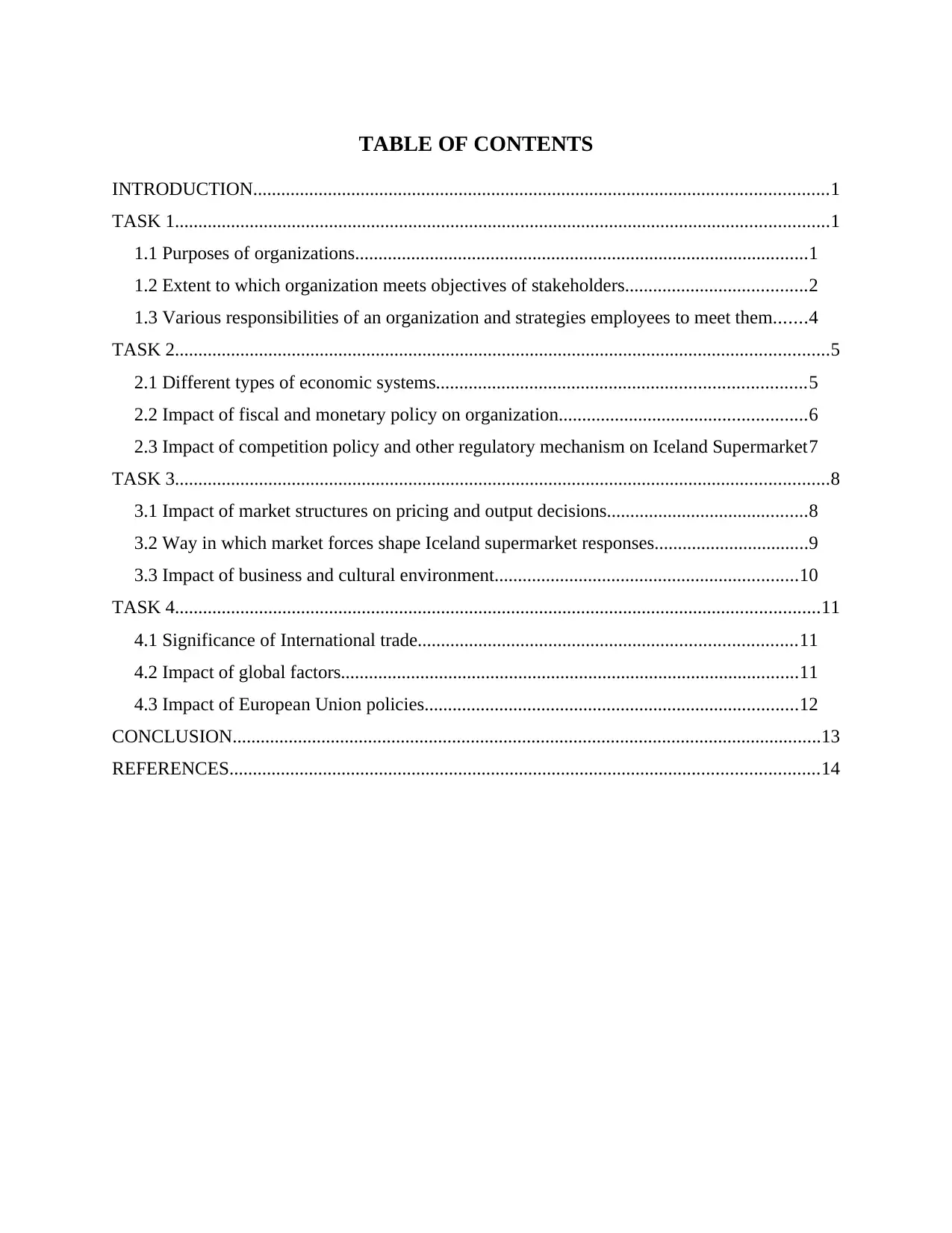
TABLE OF CONTENTS
INTRODUCTION...........................................................................................................................1
TASK 1............................................................................................................................................1
1.1 Purposes of organizations.................................................................................................1
1.2 Extent to which organization meets objectives of stakeholders.......................................2
1.3 Various responsibilities of an organization and strategies employees to meet them.......4
TASK 2............................................................................................................................................5
2.1 Different types of economic systems...............................................................................5
2.2 Impact of fiscal and monetary policy on organization.....................................................6
2.3 Impact of competition policy and other regulatory mechanism on Iceland Supermarket7
TASK 3............................................................................................................................................8
3.1 Impact of market structures on pricing and output decisions...........................................8
3.2 Way in which market forces shape Iceland supermarket responses.................................9
3.3 Impact of business and cultural environment.................................................................10
TASK 4..........................................................................................................................................11
4.1 Significance of International trade.................................................................................11
4.2 Impact of global factors..................................................................................................11
4.3 Impact of European Union policies................................................................................12
CONCLUSION..............................................................................................................................13
REFERENCES..............................................................................................................................14
INTRODUCTION...........................................................................................................................1
TASK 1............................................................................................................................................1
1.1 Purposes of organizations.................................................................................................1
1.2 Extent to which organization meets objectives of stakeholders.......................................2
1.3 Various responsibilities of an organization and strategies employees to meet them.......4
TASK 2............................................................................................................................................5
2.1 Different types of economic systems...............................................................................5
2.2 Impact of fiscal and monetary policy on organization.....................................................6
2.3 Impact of competition policy and other regulatory mechanism on Iceland Supermarket7
TASK 3............................................................................................................................................8
3.1 Impact of market structures on pricing and output decisions...........................................8
3.2 Way in which market forces shape Iceland supermarket responses.................................9
3.3 Impact of business and cultural environment.................................................................10
TASK 4..........................................................................................................................................11
4.1 Significance of International trade.................................................................................11
4.2 Impact of global factors..................................................................................................11
4.3 Impact of European Union policies................................................................................12
CONCLUSION..............................................................................................................................13
REFERENCES..............................................................................................................................14
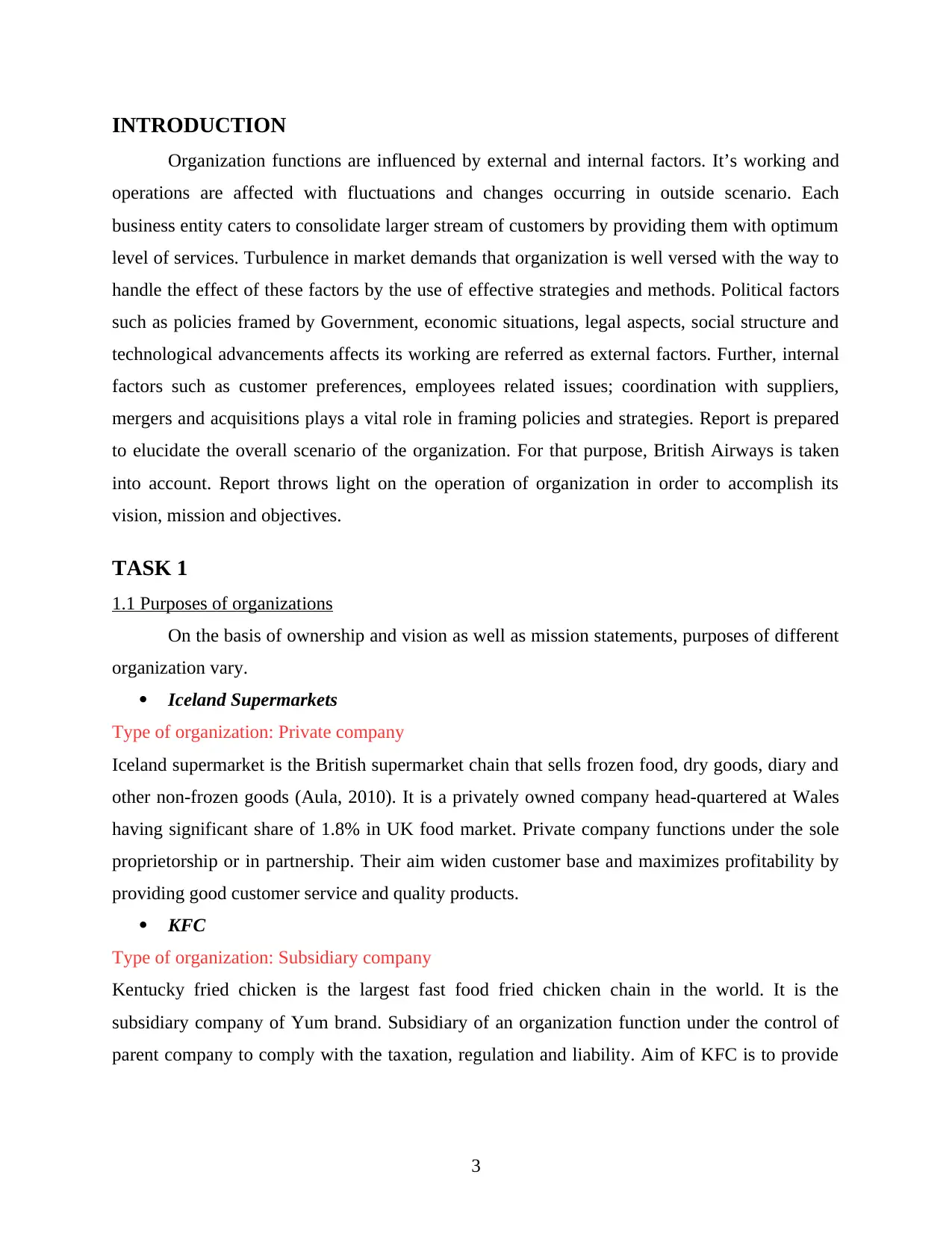
INTRODUCTION
Organization functions are influenced by external and internal factors. It’s working and
operations are affected with fluctuations and changes occurring in outside scenario. Each
business entity caters to consolidate larger stream of customers by providing them with optimum
level of services. Turbulence in market demands that organization is well versed with the way to
handle the effect of these factors by the use of effective strategies and methods. Political factors
such as policies framed by Government, economic situations, legal aspects, social structure and
technological advancements affects its working are referred as external factors. Further, internal
factors such as customer preferences, employees related issues; coordination with suppliers,
mergers and acquisitions plays a vital role in framing policies and strategies. Report is prepared
to elucidate the overall scenario of the organization. For that purpose, British Airways is taken
into account. Report throws light on the operation of organization in order to accomplish its
vision, mission and objectives.
TASK 1
1.1 Purposes of organizations
On the basis of ownership and vision as well as mission statements, purposes of different
organization vary.
Iceland Supermarkets
Type of organization: Private company
Iceland supermarket is the British supermarket chain that sells frozen food, dry goods, diary and
other non-frozen goods (Aula, 2010). It is a privately owned company head-quartered at Wales
having significant share of 1.8% in UK food market. Private company functions under the sole
proprietorship or in partnership. Their aim widen customer base and maximizes profitability by
providing good customer service and quality products.
KFC
Type of organization: Subsidiary company
Kentucky fried chicken is the largest fast food fried chicken chain in the world. It is the
subsidiary company of Yum brand. Subsidiary of an organization function under the control of
parent company to comply with the taxation, regulation and liability. Aim of KFC is to provide
3
Organization functions are influenced by external and internal factors. It’s working and
operations are affected with fluctuations and changes occurring in outside scenario. Each
business entity caters to consolidate larger stream of customers by providing them with optimum
level of services. Turbulence in market demands that organization is well versed with the way to
handle the effect of these factors by the use of effective strategies and methods. Political factors
such as policies framed by Government, economic situations, legal aspects, social structure and
technological advancements affects its working are referred as external factors. Further, internal
factors such as customer preferences, employees related issues; coordination with suppliers,
mergers and acquisitions plays a vital role in framing policies and strategies. Report is prepared
to elucidate the overall scenario of the organization. For that purpose, British Airways is taken
into account. Report throws light on the operation of organization in order to accomplish its
vision, mission and objectives.
TASK 1
1.1 Purposes of organizations
On the basis of ownership and vision as well as mission statements, purposes of different
organization vary.
Iceland Supermarkets
Type of organization: Private company
Iceland supermarket is the British supermarket chain that sells frozen food, dry goods, diary and
other non-frozen goods (Aula, 2010). It is a privately owned company head-quartered at Wales
having significant share of 1.8% in UK food market. Private company functions under the sole
proprietorship or in partnership. Their aim widen customer base and maximizes profitability by
providing good customer service and quality products.
KFC
Type of organization: Subsidiary company
Kentucky fried chicken is the largest fast food fried chicken chain in the world. It is the
subsidiary company of Yum brand. Subsidiary of an organization function under the control of
parent company to comply with the taxation, regulation and liability. Aim of KFC is to provide
3
⊘ This is a preview!⊘
Do you want full access?
Subscribe today to unlock all pages.

Trusted by 1+ million students worldwide

quality fast food by creating fast, friendly environment keeping the prices economical (Aterido,
Hallward-Driemeier and Pagés, 2011).
Transport for London (TFL)
Type of organization: Public Body
Transport for London is a government body that manages traffic system of London and frames
strategies to improve structure to provide better passage to countrymen (Aula, 2010). Along with
Government and other legislative bodies there are many organization which functions under the
control of government with any shareholders to improve living conditions of people. Powers of
these organizations are defined by the act of parliament. They are created to provide public
services in different sectors.
Cancer Research
Type of organization: Voluntary organization
Cancer research is a voluntary organization which works for prevention, diagnosis, treatment and
cure. It is a charitable organization in which research activities are carried out at all the centers
throughout nation. It is world's largest independent cancer research institute that caters in
reducing the number of deaths of cancer patients by providing information about it and running
campaigns (Björklund, 2011). Charitable organizations are funded by public, government bodies
or private organizations.
1.2 Extent to which organization meets objectives of stakeholders
No organization functions in isolation. It works under influence of different stakeholders.
Stakeholders are those entities which are directly or in directly linked with the working of
organization. Some way or the other way they support management of organization to
accomplish their goals and achieve short term or long term objectives. Major stakeholders that
significantly affect working and strategic formulation are their customers, employees and staff
members, their suppliers and Government bodies. Customers: Iceland supermarket since its establishment has been committed to provide
the best quality of food to their customers. They always ensure safe, healthy and ethically
sourced food (Budhwar and Debrah, 2013). Realizing the importance of healthy food,
organization always focuses on freshness along with the health value. Pioneered the
elimination of preservatives and artificial colors in food to retain the nutritional value
along with the flavor. All the components of operations are taken care such as the
4
Hallward-Driemeier and Pagés, 2011).
Transport for London (TFL)
Type of organization: Public Body
Transport for London is a government body that manages traffic system of London and frames
strategies to improve structure to provide better passage to countrymen (Aula, 2010). Along with
Government and other legislative bodies there are many organization which functions under the
control of government with any shareholders to improve living conditions of people. Powers of
these organizations are defined by the act of parliament. They are created to provide public
services in different sectors.
Cancer Research
Type of organization: Voluntary organization
Cancer research is a voluntary organization which works for prevention, diagnosis, treatment and
cure. It is a charitable organization in which research activities are carried out at all the centers
throughout nation. It is world's largest independent cancer research institute that caters in
reducing the number of deaths of cancer patients by providing information about it and running
campaigns (Björklund, 2011). Charitable organizations are funded by public, government bodies
or private organizations.
1.2 Extent to which organization meets objectives of stakeholders
No organization functions in isolation. It works under influence of different stakeholders.
Stakeholders are those entities which are directly or in directly linked with the working of
organization. Some way or the other way they support management of organization to
accomplish their goals and achieve short term or long term objectives. Major stakeholders that
significantly affect working and strategic formulation are their customers, employees and staff
members, their suppliers and Government bodies. Customers: Iceland supermarket since its establishment has been committed to provide
the best quality of food to their customers. They always ensure safe, healthy and ethically
sourced food (Budhwar and Debrah, 2013). Realizing the importance of healthy food,
organization always focuses on freshness along with the health value. Pioneered the
elimination of preservatives and artificial colors in food to retain the nutritional value
along with the flavor. All the components of operations are taken care such as the
4
Paraphrase This Document
Need a fresh take? Get an instant paraphrase of this document with our AI Paraphraser
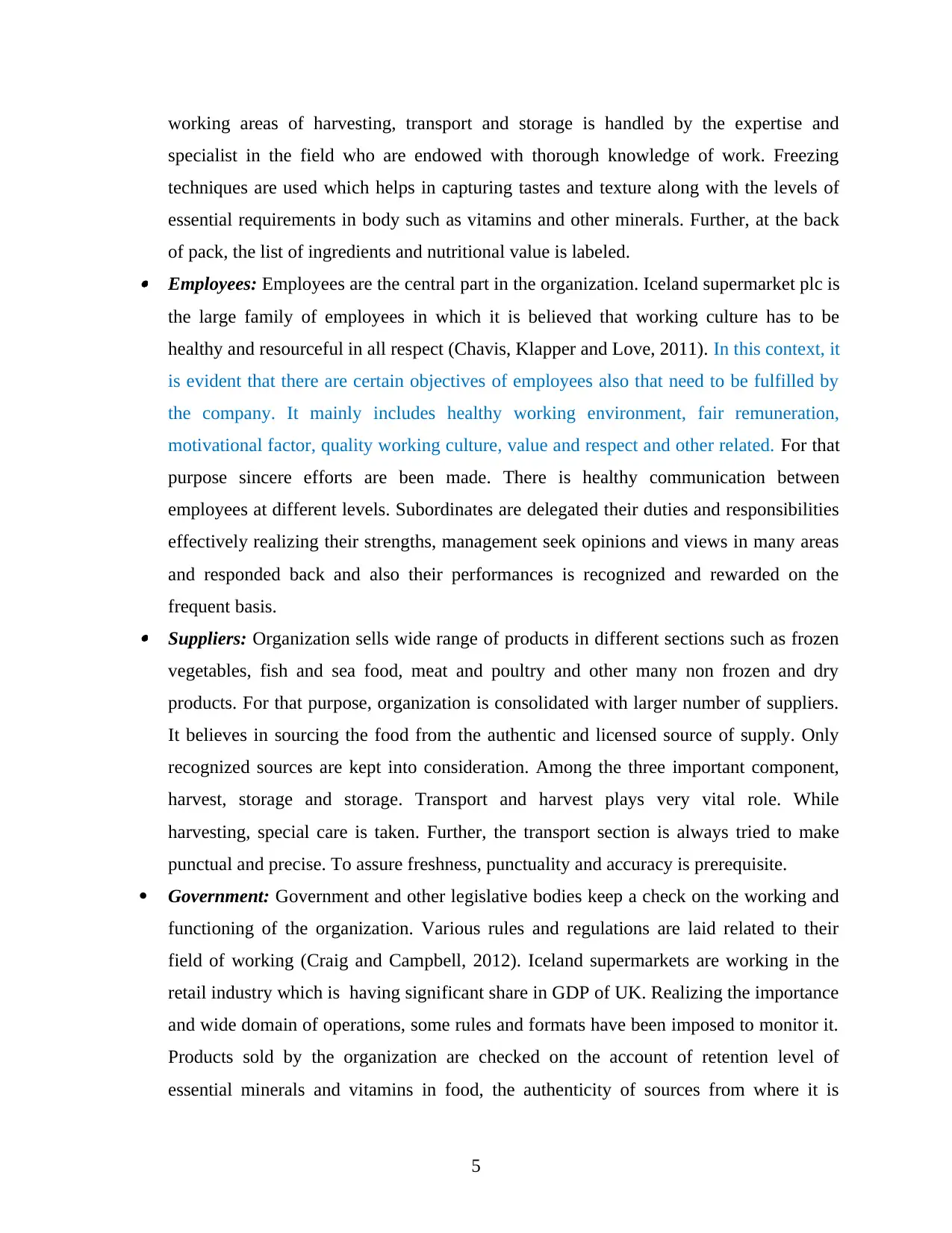
working areas of harvesting, transport and storage is handled by the expertise and
specialist in the field who are endowed with thorough knowledge of work. Freezing
techniques are used which helps in capturing tastes and texture along with the levels of
essential requirements in body such as vitamins and other minerals. Further, at the back
of pack, the list of ingredients and nutritional value is labeled. Employees: Employees are the central part in the organization. Iceland supermarket plc is
the large family of employees in which it is believed that working culture has to be
healthy and resourceful in all respect (Chavis, Klapper and Love, 2011). In this context, it
is evident that there are certain objectives of employees also that need to be fulfilled by
the company. It mainly includes healthy working environment, fair remuneration,
motivational factor, quality working culture, value and respect and other related. For that
purpose sincere efforts are been made. There is healthy communication between
employees at different levels. Subordinates are delegated their duties and responsibilities
effectively realizing their strengths, management seek opinions and views in many areas
and responded back and also their performances is recognized and rewarded on the
frequent basis. Suppliers: Organization sells wide range of products in different sections such as frozen
vegetables, fish and sea food, meat and poultry and other many non frozen and dry
products. For that purpose, organization is consolidated with larger number of suppliers.
It believes in sourcing the food from the authentic and licensed source of supply. Only
recognized sources are kept into consideration. Among the three important component,
harvest, storage and storage. Transport and harvest plays very vital role. While
harvesting, special care is taken. Further, the transport section is always tried to make
punctual and precise. To assure freshness, punctuality and accuracy is prerequisite.
Government: Government and other legislative bodies keep a check on the working and
functioning of the organization. Various rules and regulations are laid related to their
field of working (Craig and Campbell, 2012). Iceland supermarkets are working in the
retail industry which is having significant share in GDP of UK. Realizing the importance
and wide domain of operations, some rules and formats have been imposed to monitor it.
Products sold by the organization are checked on the account of retention level of
essential minerals and vitamins in food, the authenticity of sources from where it is
5
specialist in the field who are endowed with thorough knowledge of work. Freezing
techniques are used which helps in capturing tastes and texture along with the levels of
essential requirements in body such as vitamins and other minerals. Further, at the back
of pack, the list of ingredients and nutritional value is labeled. Employees: Employees are the central part in the organization. Iceland supermarket plc is
the large family of employees in which it is believed that working culture has to be
healthy and resourceful in all respect (Chavis, Klapper and Love, 2011). In this context, it
is evident that there are certain objectives of employees also that need to be fulfilled by
the company. It mainly includes healthy working environment, fair remuneration,
motivational factor, quality working culture, value and respect and other related. For that
purpose sincere efforts are been made. There is healthy communication between
employees at different levels. Subordinates are delegated their duties and responsibilities
effectively realizing their strengths, management seek opinions and views in many areas
and responded back and also their performances is recognized and rewarded on the
frequent basis. Suppliers: Organization sells wide range of products in different sections such as frozen
vegetables, fish and sea food, meat and poultry and other many non frozen and dry
products. For that purpose, organization is consolidated with larger number of suppliers.
It believes in sourcing the food from the authentic and licensed source of supply. Only
recognized sources are kept into consideration. Among the three important component,
harvest, storage and storage. Transport and harvest plays very vital role. While
harvesting, special care is taken. Further, the transport section is always tried to make
punctual and precise. To assure freshness, punctuality and accuracy is prerequisite.
Government: Government and other legislative bodies keep a check on the working and
functioning of the organization. Various rules and regulations are laid related to their
field of working (Craig and Campbell, 2012). Iceland supermarkets are working in the
retail industry which is having significant share in GDP of UK. Realizing the importance
and wide domain of operations, some rules and formats have been imposed to monitor it.
Products sold by the organization are checked on the account of retention level of
essential minerals and vitamins in food, the authenticity of sources from where it is
5
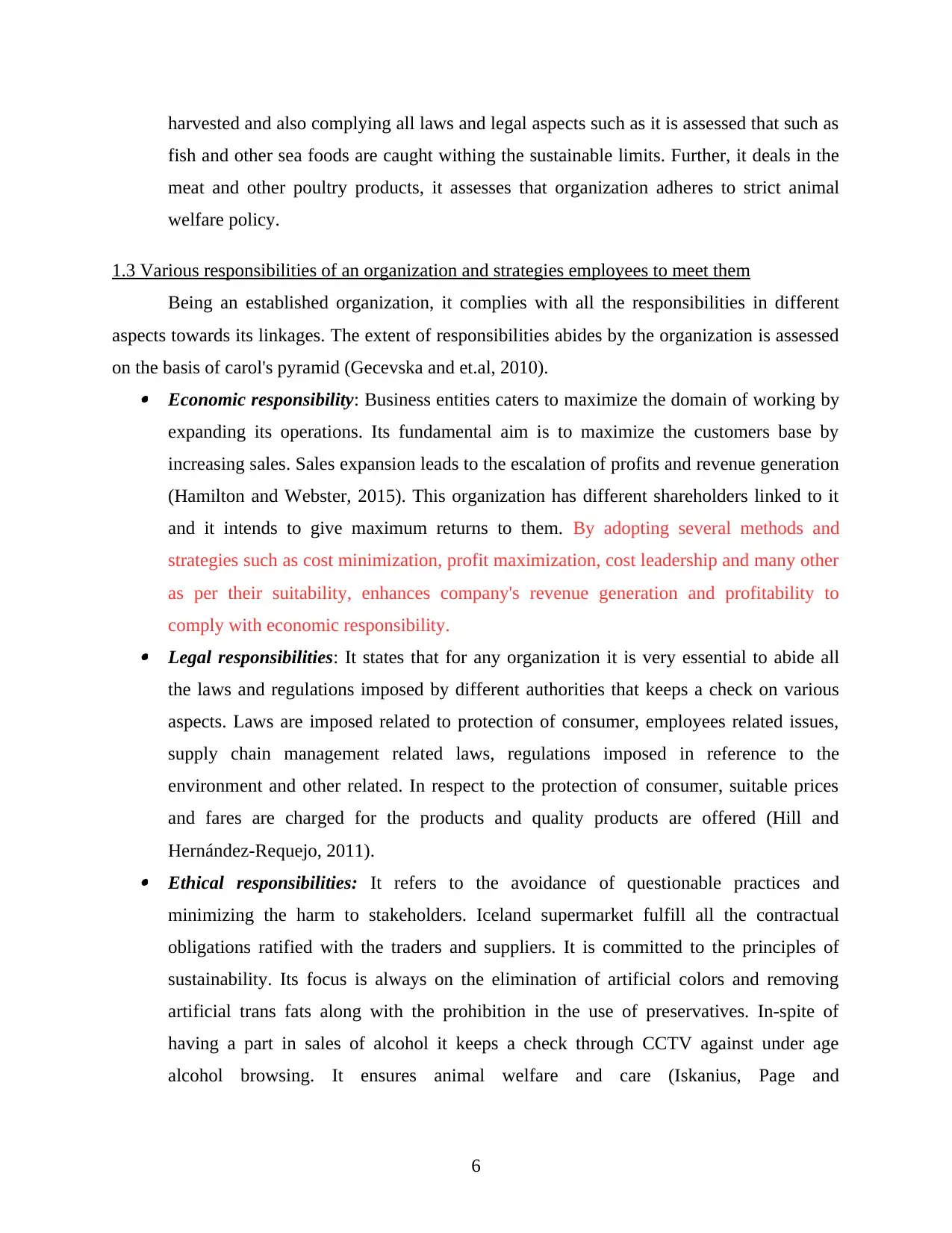
harvested and also complying all laws and legal aspects such as it is assessed that such as
fish and other sea foods are caught withing the sustainable limits. Further, it deals in the
meat and other poultry products, it assesses that organization adheres to strict animal
welfare policy.
1.3 Various responsibilities of an organization and strategies employees to meet them
Being an established organization, it complies with all the responsibilities in different
aspects towards its linkages. The extent of responsibilities abides by the organization is assessed
on the basis of carol's pyramid (Gecevska and et.al, 2010). Economic responsibility: Business entities caters to maximize the domain of working by
expanding its operations. Its fundamental aim is to maximize the customers base by
increasing sales. Sales expansion leads to the escalation of profits and revenue generation
(Hamilton and Webster, 2015). This organization has different shareholders linked to it
and it intends to give maximum returns to them. By adopting several methods and
strategies such as cost minimization, profit maximization, cost leadership and many other
as per their suitability, enhances company's revenue generation and profitability to
comply with economic responsibility. Legal responsibilities: It states that for any organization it is very essential to abide all
the laws and regulations imposed by different authorities that keeps a check on various
aspects. Laws are imposed related to protection of consumer, employees related issues,
supply chain management related laws, regulations imposed in reference to the
environment and other related. In respect to the protection of consumer, suitable prices
and fares are charged for the products and quality products are offered (Hill and
Hernández-Requejo, 2011). Ethical responsibilities: It refers to the avoidance of questionable practices and
minimizing the harm to stakeholders. Iceland supermarket fulfill all the contractual
obligations ratified with the traders and suppliers. It is committed to the principles of
sustainability. Its focus is always on the elimination of artificial colors and removing
artificial trans fats along with the prohibition in the use of preservatives. In-spite of
having a part in sales of alcohol it keeps a check through CCTV against under age
alcohol browsing. It ensures animal welfare and care (Iskanius, Page and
6
fish and other sea foods are caught withing the sustainable limits. Further, it deals in the
meat and other poultry products, it assesses that organization adheres to strict animal
welfare policy.
1.3 Various responsibilities of an organization and strategies employees to meet them
Being an established organization, it complies with all the responsibilities in different
aspects towards its linkages. The extent of responsibilities abides by the organization is assessed
on the basis of carol's pyramid (Gecevska and et.al, 2010). Economic responsibility: Business entities caters to maximize the domain of working by
expanding its operations. Its fundamental aim is to maximize the customers base by
increasing sales. Sales expansion leads to the escalation of profits and revenue generation
(Hamilton and Webster, 2015). This organization has different shareholders linked to it
and it intends to give maximum returns to them. By adopting several methods and
strategies such as cost minimization, profit maximization, cost leadership and many other
as per their suitability, enhances company's revenue generation and profitability to
comply with economic responsibility. Legal responsibilities: It states that for any organization it is very essential to abide all
the laws and regulations imposed by different authorities that keeps a check on various
aspects. Laws are imposed related to protection of consumer, employees related issues,
supply chain management related laws, regulations imposed in reference to the
environment and other related. In respect to the protection of consumer, suitable prices
and fares are charged for the products and quality products are offered (Hill and
Hernández-Requejo, 2011). Ethical responsibilities: It refers to the avoidance of questionable practices and
minimizing the harm to stakeholders. Iceland supermarket fulfill all the contractual
obligations ratified with the traders and suppliers. It is committed to the principles of
sustainability. Its focus is always on the elimination of artificial colors and removing
artificial trans fats along with the prohibition in the use of preservatives. In-spite of
having a part in sales of alcohol it keeps a check through CCTV against under age
alcohol browsing. It ensures animal welfare and care (Iskanius, Page and
6
⊘ This is a preview!⊘
Do you want full access?
Subscribe today to unlock all pages.

Trusted by 1+ million students worldwide
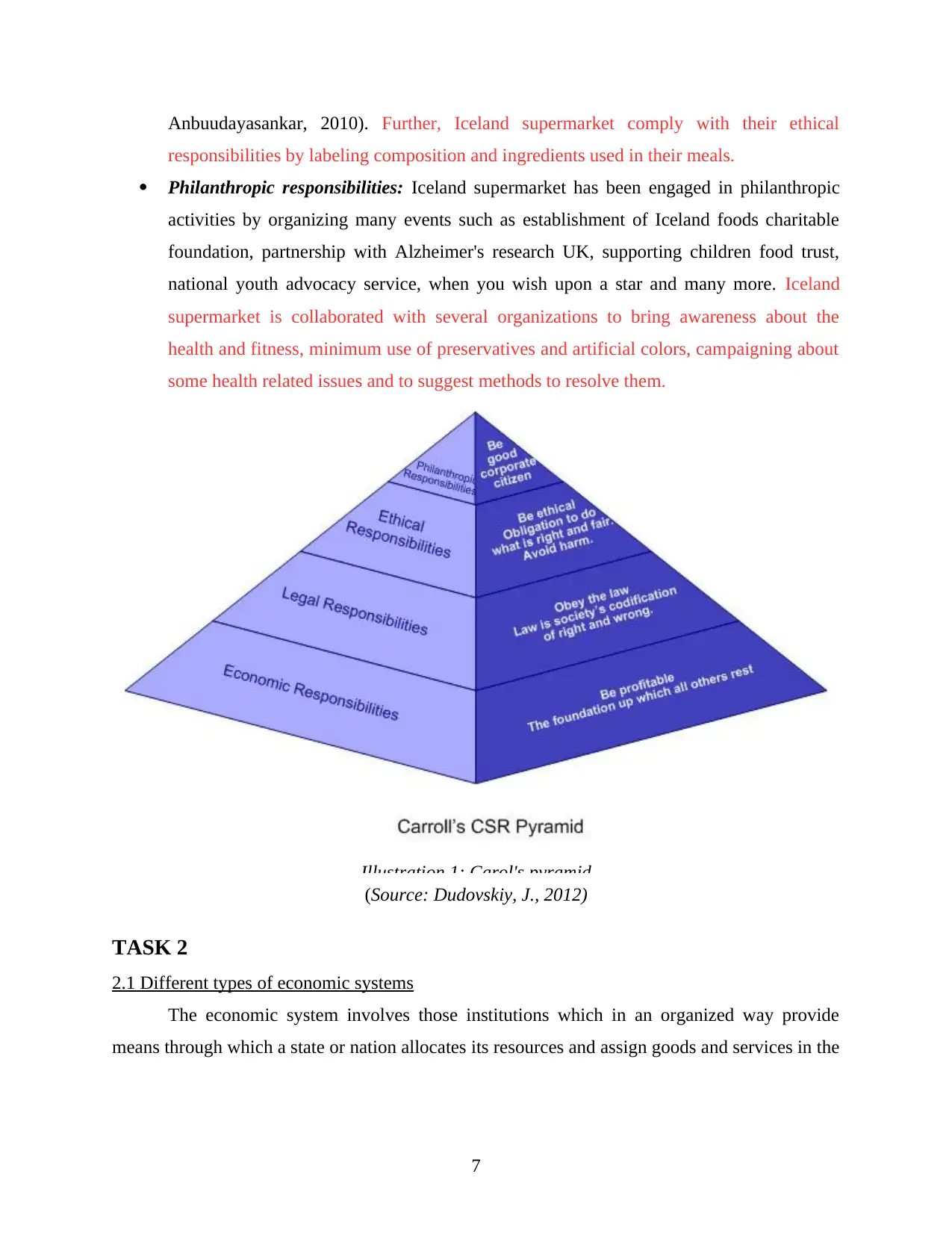
Anbuudayasankar, 2010). Further, Iceland supermarket comply with their ethical
responsibilities by labeling composition and ingredients used in their meals.
Philanthropic responsibilities: Iceland supermarket has been engaged in philanthropic
activities by organizing many events such as establishment of Iceland foods charitable
foundation, partnership with Alzheimer's research UK, supporting children food trust,
national youth advocacy service, when you wish upon a star and many more. Iceland
supermarket is collaborated with several organizations to bring awareness about the
health and fitness, minimum use of preservatives and artificial colors, campaigning about
some health related issues and to suggest methods to resolve them.
(Source: Dudovskiy, J., 2012)
TASK 2
2.1 Different types of economic systems
The economic system involves those institutions which in an organized way provide
means through which a state or nation allocates its resources and assign goods and services in the
7
Illustration 1: Carol's pyramid
responsibilities by labeling composition and ingredients used in their meals.
Philanthropic responsibilities: Iceland supermarket has been engaged in philanthropic
activities by organizing many events such as establishment of Iceland foods charitable
foundation, partnership with Alzheimer's research UK, supporting children food trust,
national youth advocacy service, when you wish upon a star and many more. Iceland
supermarket is collaborated with several organizations to bring awareness about the
health and fitness, minimum use of preservatives and artificial colors, campaigning about
some health related issues and to suggest methods to resolve them.
(Source: Dudovskiy, J., 2012)
TASK 2
2.1 Different types of economic systems
The economic system involves those institutions which in an organized way provide
means through which a state or nation allocates its resources and assign goods and services in the
7
Illustration 1: Carol's pyramid
Paraphrase This Document
Need a fresh take? Get an instant paraphrase of this document with our AI Paraphraser

national community. Basically, it deals with the three main question: What to produce, how to
produce and for whom to produce. The following are different economic systems present: Transition Economy- The traditional economies incorporate with the historic strength of
the social customs. It is the one in which the new generation retains the economic
positions of its parents and grandparents. As the economic system are not dynamic more
experimental strategies denied which hinders retail business of leading Iceland Company.
Countries like South America, Africa and Asia are examples of some traditional
economies (Björklund, 2011). Command Economy- All economic activities are dealt by its own government refers to
command economy. Command economies are less flexible than other economic systems
leading slow changing consumer purchasing patterns. Though this economy is not
favorable for Iceland supermarket to function because of the rigidity and lack of
opportunities to explode. Cuba is considered among the government directed economy
i.e, command economic system. Free Market Economy- Market economies determine resource allocation and distribution
of goods on the basis of unshackled interactions of companies and individuals in the
market area. The market trends and products generate the demand of goods to be
produced (Hamilton and Webster, 2015). Though no truly free market economy subsist in
the world therefore Iceland supermarket too, partially adopts this economy pattern. If
Iceland supermarket shapes into this economy, it has maximum powers to take decision
with reference to pricing and output creation. With the least amount of involvement of
Government, mentioned organization is entitled to make chages and take decisions.
Mixed Economy- The combination of market and command economy results in mixed
economy. Theoretically, the mixed economy runs with the right proportion of
government controls and market forces. Today the United Kingdom is an eminent
follower of this type of economy. Also, it is a plausible economic system for Iceland
supermarket, the demand and supply forces work on market forces and limited
government control enhances the process.
8
produce and for whom to produce. The following are different economic systems present: Transition Economy- The traditional economies incorporate with the historic strength of
the social customs. It is the one in which the new generation retains the economic
positions of its parents and grandparents. As the economic system are not dynamic more
experimental strategies denied which hinders retail business of leading Iceland Company.
Countries like South America, Africa and Asia are examples of some traditional
economies (Björklund, 2011). Command Economy- All economic activities are dealt by its own government refers to
command economy. Command economies are less flexible than other economic systems
leading slow changing consumer purchasing patterns. Though this economy is not
favorable for Iceland supermarket to function because of the rigidity and lack of
opportunities to explode. Cuba is considered among the government directed economy
i.e, command economic system. Free Market Economy- Market economies determine resource allocation and distribution
of goods on the basis of unshackled interactions of companies and individuals in the
market area. The market trends and products generate the demand of goods to be
produced (Hamilton and Webster, 2015). Though no truly free market economy subsist in
the world therefore Iceland supermarket too, partially adopts this economy pattern. If
Iceland supermarket shapes into this economy, it has maximum powers to take decision
with reference to pricing and output creation. With the least amount of involvement of
Government, mentioned organization is entitled to make chages and take decisions.
Mixed Economy- The combination of market and command economy results in mixed
economy. Theoretically, the mixed economy runs with the right proportion of
government controls and market forces. Today the United Kingdom is an eminent
follower of this type of economy. Also, it is a plausible economic system for Iceland
supermarket, the demand and supply forces work on market forces and limited
government control enhances the process.
8
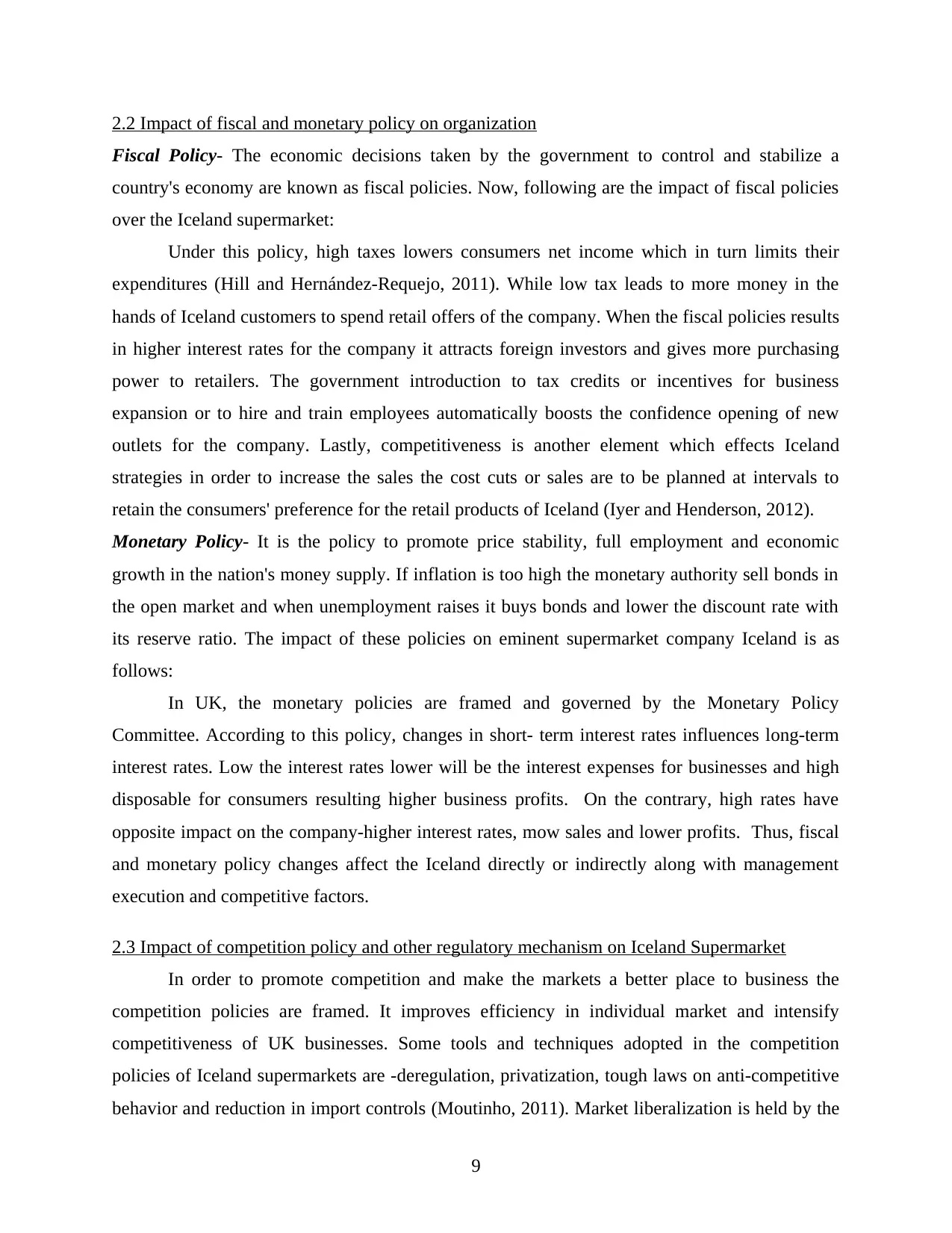
2.2 Impact of fiscal and monetary policy on organization
Fiscal Policy- The economic decisions taken by the government to control and stabilize a
country's economy are known as fiscal policies. Now, following are the impact of fiscal policies
over the Iceland supermarket:
Under this policy, high taxes lowers consumers net income which in turn limits their
expenditures (Hill and Hernández-Requejo, 2011). While low tax leads to more money in the
hands of Iceland customers to spend retail offers of the company. When the fiscal policies results
in higher interest rates for the company it attracts foreign investors and gives more purchasing
power to retailers. The government introduction to tax credits or incentives for business
expansion or to hire and train employees automatically boosts the confidence opening of new
outlets for the company. Lastly, competitiveness is another element which effects Iceland
strategies in order to increase the sales the cost cuts or sales are to be planned at intervals to
retain the consumers' preference for the retail products of Iceland (Iyer and Henderson, 2012).
Monetary Policy- It is the policy to promote price stability, full employment and economic
growth in the nation's money supply. If inflation is too high the monetary authority sell bonds in
the open market and when unemployment raises it buys bonds and lower the discount rate with
its reserve ratio. The impact of these policies on eminent supermarket company Iceland is as
follows:
In UK, the monetary policies are framed and governed by the Monetary Policy
Committee. According to this policy, changes in short- term interest rates influences long-term
interest rates. Low the interest rates lower will be the interest expenses for businesses and high
disposable for consumers resulting higher business profits. On the contrary, high rates have
opposite impact on the company-higher interest rates, mow sales and lower profits. Thus, fiscal
and monetary policy changes affect the Iceland directly or indirectly along with management
execution and competitive factors.
2.3 Impact of competition policy and other regulatory mechanism on Iceland Supermarket
In order to promote competition and make the markets a better place to business the
competition policies are framed. It improves efficiency in individual market and intensify
competitiveness of UK businesses. Some tools and techniques adopted in the competition
policies of Iceland supermarkets are -deregulation, privatization, tough laws on anti-competitive
behavior and reduction in import controls (Moutinho, 2011). Market liberalization is held by the
9
Fiscal Policy- The economic decisions taken by the government to control and stabilize a
country's economy are known as fiscal policies. Now, following are the impact of fiscal policies
over the Iceland supermarket:
Under this policy, high taxes lowers consumers net income which in turn limits their
expenditures (Hill and Hernández-Requejo, 2011). While low tax leads to more money in the
hands of Iceland customers to spend retail offers of the company. When the fiscal policies results
in higher interest rates for the company it attracts foreign investors and gives more purchasing
power to retailers. The government introduction to tax credits or incentives for business
expansion or to hire and train employees automatically boosts the confidence opening of new
outlets for the company. Lastly, competitiveness is another element which effects Iceland
strategies in order to increase the sales the cost cuts or sales are to be planned at intervals to
retain the consumers' preference for the retail products of Iceland (Iyer and Henderson, 2012).
Monetary Policy- It is the policy to promote price stability, full employment and economic
growth in the nation's money supply. If inflation is too high the monetary authority sell bonds in
the open market and when unemployment raises it buys bonds and lower the discount rate with
its reserve ratio. The impact of these policies on eminent supermarket company Iceland is as
follows:
In UK, the monetary policies are framed and governed by the Monetary Policy
Committee. According to this policy, changes in short- term interest rates influences long-term
interest rates. Low the interest rates lower will be the interest expenses for businesses and high
disposable for consumers resulting higher business profits. On the contrary, high rates have
opposite impact on the company-higher interest rates, mow sales and lower profits. Thus, fiscal
and monetary policy changes affect the Iceland directly or indirectly along with management
execution and competitive factors.
2.3 Impact of competition policy and other regulatory mechanism on Iceland Supermarket
In order to promote competition and make the markets a better place to business the
competition policies are framed. It improves efficiency in individual market and intensify
competitiveness of UK businesses. Some tools and techniques adopted in the competition
policies of Iceland supermarkets are -deregulation, privatization, tough laws on anti-competitive
behavior and reduction in import controls (Moutinho, 2011). Market liberalization is held by the
9
⊘ This is a preview!⊘
Do you want full access?
Subscribe today to unlock all pages.

Trusted by 1+ million students worldwide
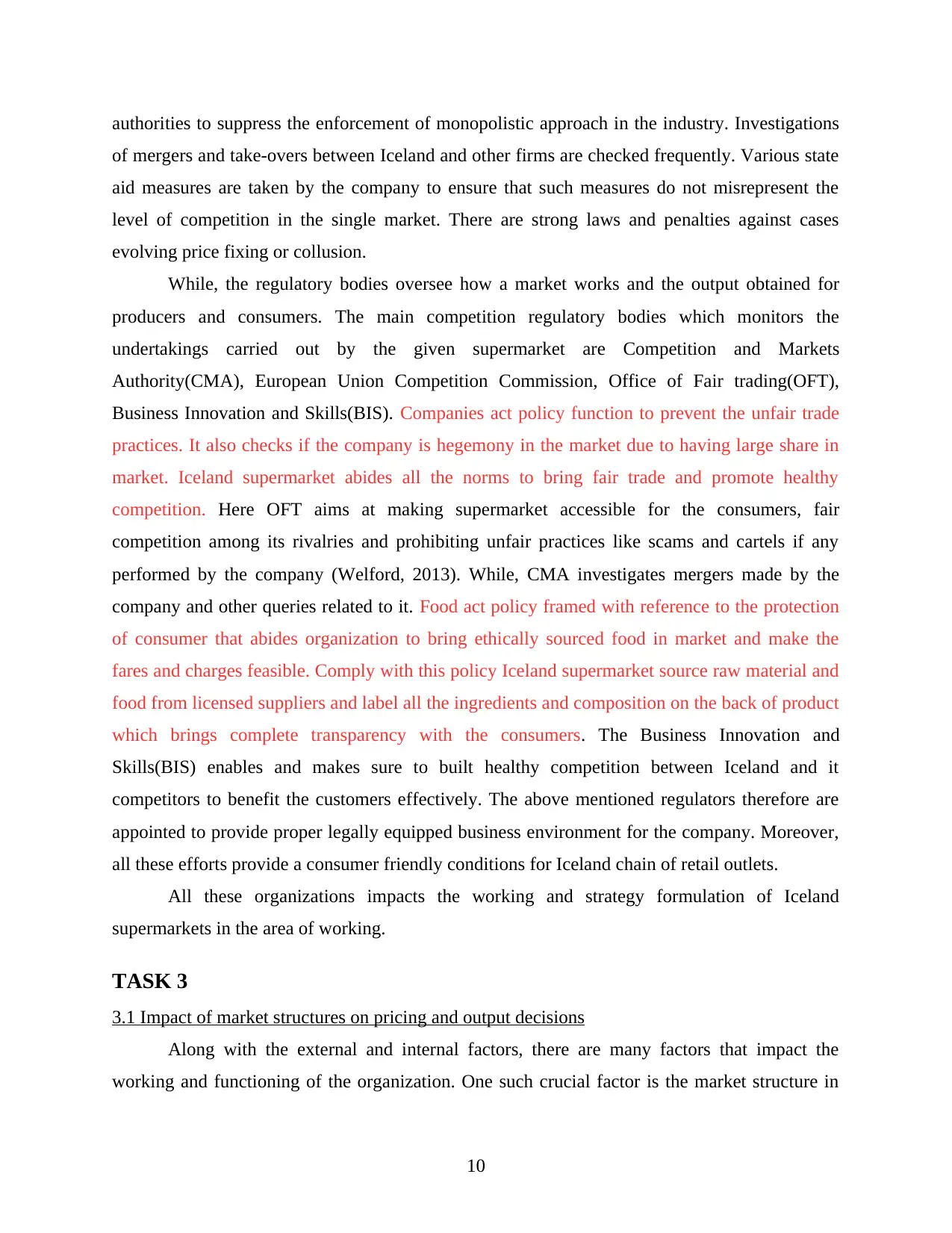
authorities to suppress the enforcement of monopolistic approach in the industry. Investigations
of mergers and take-overs between Iceland and other firms are checked frequently. Various state
aid measures are taken by the company to ensure that such measures do not misrepresent the
level of competition in the single market. There are strong laws and penalties against cases
evolving price fixing or collusion.
While, the regulatory bodies oversee how a market works and the output obtained for
producers and consumers. The main competition regulatory bodies which monitors the
undertakings carried out by the given supermarket are Competition and Markets
Authority(CMA), European Union Competition Commission, Office of Fair trading(OFT),
Business Innovation and Skills(BIS). Companies act policy function to prevent the unfair trade
practices. It also checks if the company is hegemony in the market due to having large share in
market. Iceland supermarket abides all the norms to bring fair trade and promote healthy
competition. Here OFT aims at making supermarket accessible for the consumers, fair
competition among its rivalries and prohibiting unfair practices like scams and cartels if any
performed by the company (Welford, 2013). While, CMA investigates mergers made by the
company and other queries related to it. Food act policy framed with reference to the protection
of consumer that abides organization to bring ethically sourced food in market and make the
fares and charges feasible. Comply with this policy Iceland supermarket source raw material and
food from licensed suppliers and label all the ingredients and composition on the back of product
which brings complete transparency with the consumers. The Business Innovation and
Skills(BIS) enables and makes sure to built healthy competition between Iceland and it
competitors to benefit the customers effectively. The above mentioned regulators therefore are
appointed to provide proper legally equipped business environment for the company. Moreover,
all these efforts provide a consumer friendly conditions for Iceland chain of retail outlets.
All these organizations impacts the working and strategy formulation of Iceland
supermarkets in the area of working.
TASK 3
3.1 Impact of market structures on pricing and output decisions
Along with the external and internal factors, there are many factors that impact the
working and functioning of the organization. One such crucial factor is the market structure in
10
of mergers and take-overs between Iceland and other firms are checked frequently. Various state
aid measures are taken by the company to ensure that such measures do not misrepresent the
level of competition in the single market. There are strong laws and penalties against cases
evolving price fixing or collusion.
While, the regulatory bodies oversee how a market works and the output obtained for
producers and consumers. The main competition regulatory bodies which monitors the
undertakings carried out by the given supermarket are Competition and Markets
Authority(CMA), European Union Competition Commission, Office of Fair trading(OFT),
Business Innovation and Skills(BIS). Companies act policy function to prevent the unfair trade
practices. It also checks if the company is hegemony in the market due to having large share in
market. Iceland supermarket abides all the norms to bring fair trade and promote healthy
competition. Here OFT aims at making supermarket accessible for the consumers, fair
competition among its rivalries and prohibiting unfair practices like scams and cartels if any
performed by the company (Welford, 2013). While, CMA investigates mergers made by the
company and other queries related to it. Food act policy framed with reference to the protection
of consumer that abides organization to bring ethically sourced food in market and make the
fares and charges feasible. Comply with this policy Iceland supermarket source raw material and
food from licensed suppliers and label all the ingredients and composition on the back of product
which brings complete transparency with the consumers. The Business Innovation and
Skills(BIS) enables and makes sure to built healthy competition between Iceland and it
competitors to benefit the customers effectively. The above mentioned regulators therefore are
appointed to provide proper legally equipped business environment for the company. Moreover,
all these efforts provide a consumer friendly conditions for Iceland chain of retail outlets.
All these organizations impacts the working and strategy formulation of Iceland
supermarkets in the area of working.
TASK 3
3.1 Impact of market structures on pricing and output decisions
Along with the external and internal factors, there are many factors that impact the
working and functioning of the organization. One such crucial factor is the market structure in
10
Paraphrase This Document
Need a fresh take? Get an instant paraphrase of this document with our AI Paraphraser
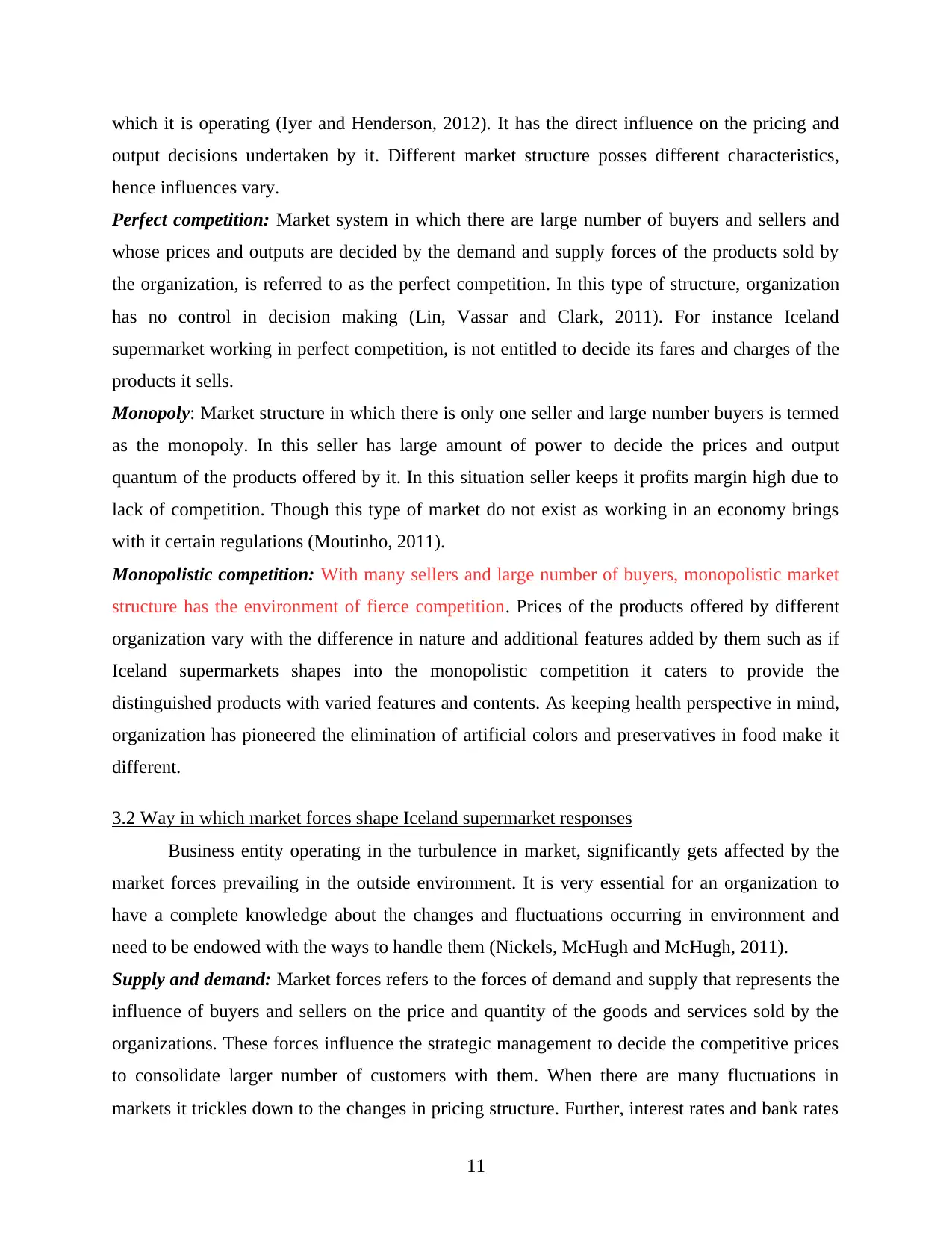
which it is operating (Iyer and Henderson, 2012). It has the direct influence on the pricing and
output decisions undertaken by it. Different market structure posses different characteristics,
hence influences vary.
Perfect competition: Market system in which there are large number of buyers and sellers and
whose prices and outputs are decided by the demand and supply forces of the products sold by
the organization, is referred to as the perfect competition. In this type of structure, organization
has no control in decision making (Lin, Vassar and Clark, 2011). For instance Iceland
supermarket working in perfect competition, is not entitled to decide its fares and charges of the
products it sells.
Monopoly: Market structure in which there is only one seller and large number buyers is termed
as the monopoly. In this seller has large amount of power to decide the prices and output
quantum of the products offered by it. In this situation seller keeps it profits margin high due to
lack of competition. Though this type of market do not exist as working in an economy brings
with it certain regulations (Moutinho, 2011).
Monopolistic competition: With many sellers and large number of buyers, monopolistic market
structure has the environment of fierce competition. Prices of the products offered by different
organization vary with the difference in nature and additional features added by them such as if
Iceland supermarkets shapes into the monopolistic competition it caters to provide the
distinguished products with varied features and contents. As keeping health perspective in mind,
organization has pioneered the elimination of artificial colors and preservatives in food make it
different.
3.2 Way in which market forces shape Iceland supermarket responses
Business entity operating in the turbulence in market, significantly gets affected by the
market forces prevailing in the outside environment. It is very essential for an organization to
have a complete knowledge about the changes and fluctuations occurring in environment and
need to be endowed with the ways to handle them (Nickels, McHugh and McHugh, 2011).
Supply and demand: Market forces refers to the forces of demand and supply that represents the
influence of buyers and sellers on the price and quantity of the goods and services sold by the
organizations. These forces influence the strategic management to decide the competitive prices
to consolidate larger number of customers with them. When there are many fluctuations in
markets it trickles down to the changes in pricing structure. Further, interest rates and bank rates
11
output decisions undertaken by it. Different market structure posses different characteristics,
hence influences vary.
Perfect competition: Market system in which there are large number of buyers and sellers and
whose prices and outputs are decided by the demand and supply forces of the products sold by
the organization, is referred to as the perfect competition. In this type of structure, organization
has no control in decision making (Lin, Vassar and Clark, 2011). For instance Iceland
supermarket working in perfect competition, is not entitled to decide its fares and charges of the
products it sells.
Monopoly: Market structure in which there is only one seller and large number buyers is termed
as the monopoly. In this seller has large amount of power to decide the prices and output
quantum of the products offered by it. In this situation seller keeps it profits margin high due to
lack of competition. Though this type of market do not exist as working in an economy brings
with it certain regulations (Moutinho, 2011).
Monopolistic competition: With many sellers and large number of buyers, monopolistic market
structure has the environment of fierce competition. Prices of the products offered by different
organization vary with the difference in nature and additional features added by them such as if
Iceland supermarkets shapes into the monopolistic competition it caters to provide the
distinguished products with varied features and contents. As keeping health perspective in mind,
organization has pioneered the elimination of artificial colors and preservatives in food make it
different.
3.2 Way in which market forces shape Iceland supermarket responses
Business entity operating in the turbulence in market, significantly gets affected by the
market forces prevailing in the outside environment. It is very essential for an organization to
have a complete knowledge about the changes and fluctuations occurring in environment and
need to be endowed with the ways to handle them (Nickels, McHugh and McHugh, 2011).
Supply and demand: Market forces refers to the forces of demand and supply that represents the
influence of buyers and sellers on the price and quantity of the goods and services sold by the
organizations. These forces influence the strategic management to decide the competitive prices
to consolidate larger number of customers with them. When there are many fluctuations in
markets it trickles down to the changes in pricing structure. Further, interest rates and bank rates
11
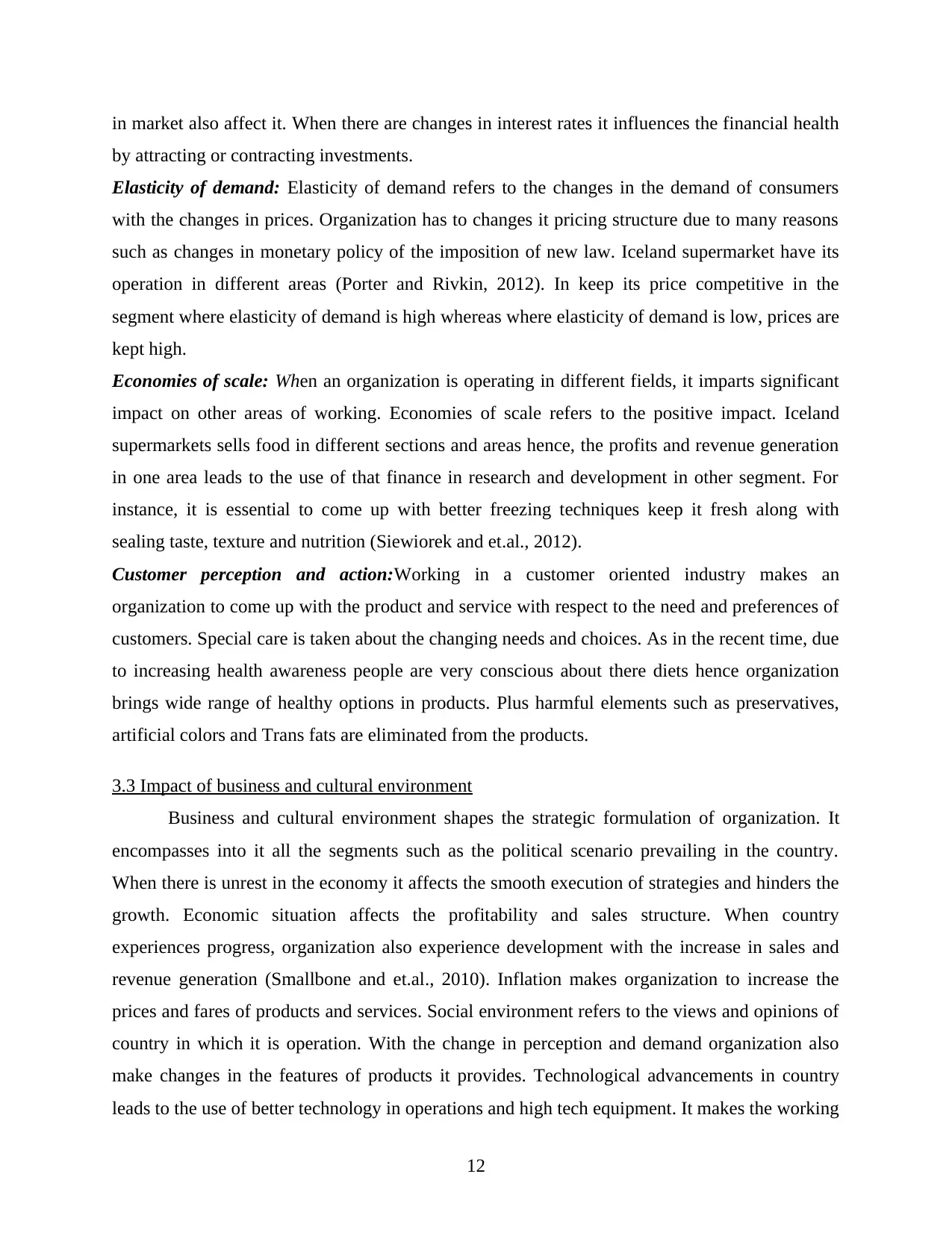
in market also affect it. When there are changes in interest rates it influences the financial health
by attracting or contracting investments.
Elasticity of demand: Elasticity of demand refers to the changes in the demand of consumers
with the changes in prices. Organization has to changes it pricing structure due to many reasons
such as changes in monetary policy of the imposition of new law. Iceland supermarket have its
operation in different areas (Porter and Rivkin, 2012). In keep its price competitive in the
segment where elasticity of demand is high whereas where elasticity of demand is low, prices are
kept high.
Economies of scale: When an organization is operating in different fields, it imparts significant
impact on other areas of working. Economies of scale refers to the positive impact. Iceland
supermarkets sells food in different sections and areas hence, the profits and revenue generation
in one area leads to the use of that finance in research and development in other segment. For
instance, it is essential to come up with better freezing techniques keep it fresh along with
sealing taste, texture and nutrition (Siewiorek and et.al., 2012).
Customer perception and action:Working in a customer oriented industry makes an
organization to come up with the product and service with respect to the need and preferences of
customers. Special care is taken about the changing needs and choices. As in the recent time, due
to increasing health awareness people are very conscious about there diets hence organization
brings wide range of healthy options in products. Plus harmful elements such as preservatives,
artificial colors and Trans fats are eliminated from the products.
3.3 Impact of business and cultural environment
Business and cultural environment shapes the strategic formulation of organization. It
encompasses into it all the segments such as the political scenario prevailing in the country.
When there is unrest in the economy it affects the smooth execution of strategies and hinders the
growth. Economic situation affects the profitability and sales structure. When country
experiences progress, organization also experience development with the increase in sales and
revenue generation (Smallbone and et.al., 2010). Inflation makes organization to increase the
prices and fares of products and services. Social environment refers to the views and opinions of
country in which it is operation. With the change in perception and demand organization also
make changes in the features of products it provides. Technological advancements in country
leads to the use of better technology in operations and high tech equipment. It makes the working
12
by attracting or contracting investments.
Elasticity of demand: Elasticity of demand refers to the changes in the demand of consumers
with the changes in prices. Organization has to changes it pricing structure due to many reasons
such as changes in monetary policy of the imposition of new law. Iceland supermarket have its
operation in different areas (Porter and Rivkin, 2012). In keep its price competitive in the
segment where elasticity of demand is high whereas where elasticity of demand is low, prices are
kept high.
Economies of scale: When an organization is operating in different fields, it imparts significant
impact on other areas of working. Economies of scale refers to the positive impact. Iceland
supermarkets sells food in different sections and areas hence, the profits and revenue generation
in one area leads to the use of that finance in research and development in other segment. For
instance, it is essential to come up with better freezing techniques keep it fresh along with
sealing taste, texture and nutrition (Siewiorek and et.al., 2012).
Customer perception and action:Working in a customer oriented industry makes an
organization to come up with the product and service with respect to the need and preferences of
customers. Special care is taken about the changing needs and choices. As in the recent time, due
to increasing health awareness people are very conscious about there diets hence organization
brings wide range of healthy options in products. Plus harmful elements such as preservatives,
artificial colors and Trans fats are eliminated from the products.
3.3 Impact of business and cultural environment
Business and cultural environment shapes the strategic formulation of organization. It
encompasses into it all the segments such as the political scenario prevailing in the country.
When there is unrest in the economy it affects the smooth execution of strategies and hinders the
growth. Economic situation affects the profitability and sales structure. When country
experiences progress, organization also experience development with the increase in sales and
revenue generation (Smallbone and et.al., 2010). Inflation makes organization to increase the
prices and fares of products and services. Social environment refers to the views and opinions of
country in which it is operation. With the change in perception and demand organization also
make changes in the features of products it provides. Technological advancements in country
leads to the use of better technology in operations and high tech equipment. It makes the working
12
⊘ This is a preview!⊘
Do you want full access?
Subscribe today to unlock all pages.

Trusted by 1+ million students worldwide
1 out of 17
Related Documents
Your All-in-One AI-Powered Toolkit for Academic Success.
+13062052269
info@desklib.com
Available 24*7 on WhatsApp / Email
![[object Object]](/_next/static/media/star-bottom.7253800d.svg)
Unlock your academic potential
Copyright © 2020–2026 A2Z Services. All Rights Reserved. Developed and managed by ZUCOL.





